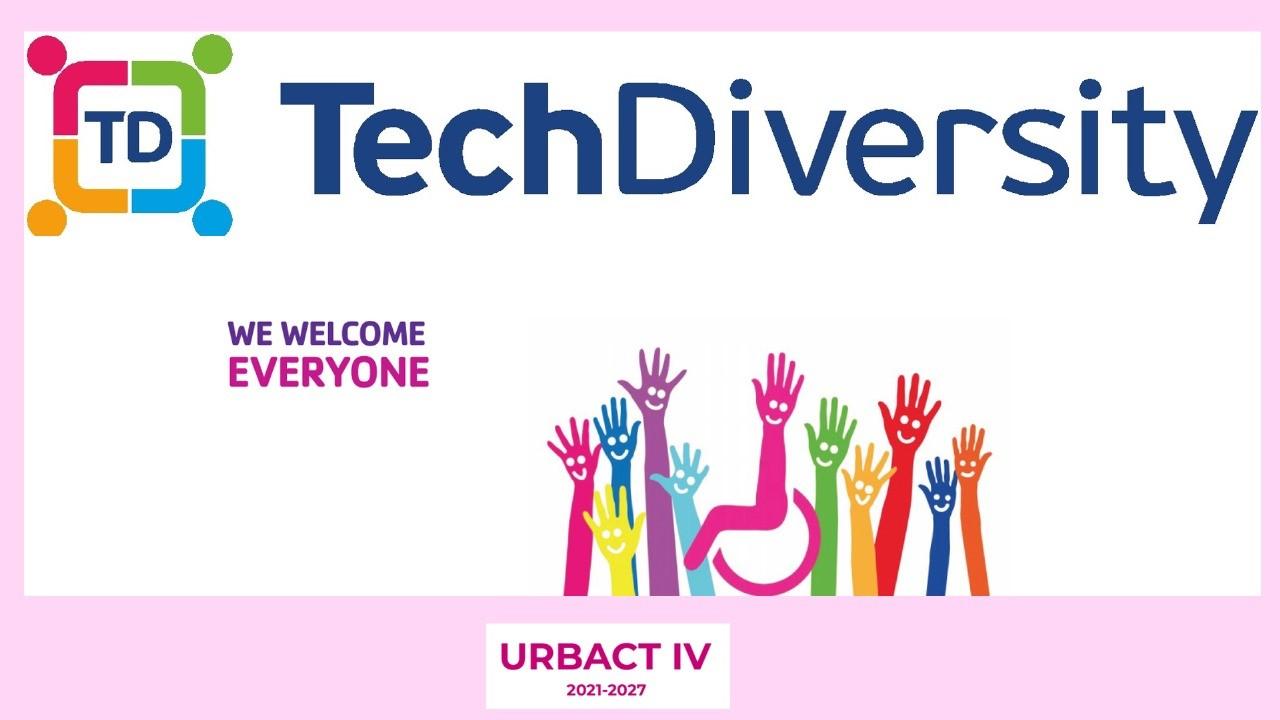TechDiversity is an URBACT network of eight partners representing small and medium-sized European cities, that aim to boost and facilitate diverse local communities that are not active in Tech & Digital sector, facing specific challenges in terms of diversity, gender equality and inclusion. Furthermore, the partner cities will mainly focus on an identified pressing aspect and will support at least one diverse local group in each of the participating cities, through the action plans.
TechDiversity core policy issue is the lack of diverse communities looking to grow knowledge-based digital and tech ecosystems …
Once the project implementation was approved to be funded by URBACT and started its journey from the City of Trikala to other 7 cities around Europe, all people involved in the project had a lot of thoughts and concerns on this policy field and most of them considered as critical the following reflections:
Is the project’s policy issue more critical for larger cities?
What makes a small-medium city more diverse in its digital ecosystem?
The absence of diverse groups in the tech and digital industry is becoming a major issue even for small and medium cities aiming to establish high value knowledge-based digital and tech ecosystems. While some larger cities are starting to develop potential solutions to this problem, smaller ones cannot afford to miss out on more than half of the population, nor can the industries that are home to. One possible approach is to ensure that all members of the community can participate in the city’s digital ecosystem, and to connect underrepresented populations to employment and entrepreneurship opportunities in digital and tech.
Digital ecosystem and TechDiversity
Digital ecosystem refers to the economic activity that results from everyday online connections among people, businesses, public services, data, and processes. In the context of TechDiversity, the digital ecosystem refers to the use of technology to create more inclusive and equitable economic opportunities in cities. It will be the common starting point for all cities to prepare their expected Action Plans at the end of the project.
Core factors contributing to make a small to medium-sized city more diverse in its digital ecosystem.
Some key elements to achieve a more diverse ecosystem are:
The presence of universities, research centers, and educational institutions, as also Tech Incubators and Accelerators.
Collaborative Spaces as co-working spaces and innovation hubs provide a platform for professionals from different backgrounds to collaborate, share ideas, and work on projects together.
Diversity and Inclusion Programs promoting them in the workforce can lead to a broader range of perspectives, ideas, and approaches, enhancing the overall creativity and innovation within the digital ecosystem.
A culturally diverse population can contribute to a rich and varied digital ecosystem by bringing in different perspectives, experiences, and approaches to problem-solving.
Collaboration between local industries and the digital sector can lead to the development of innovative solutions tailored to specific local needs.
The availability of continuous education and training programs that adapt to the evolving needs of the digital economy ensures that the workforce remains diverse and skilled.
Supportive policies and initiatives by local governments can encourage the growth of the digital ecosystem. This includes tax incentives, regulatory support, and infrastructure development.
In summary, a combination of supportive policies, infrastructure, networking opportunities, and a commitment to diversity and inclusion can contribute to making a small to medium-sized city more diverse and vibrant in its digital ecosystem.
Enhancing the diversity of digital ecosystem in small to medium-sized cities.
Some key elements that contribute to a more diverse digital ecosystem are:
Startup Culture and Incubators, Education and Skill Development, Diversity and Inclusion Initiatives, Networking Events and Meetups, Infrastructure and Connectivity, Government Support and Policies, Access to Funding, Smart City Initiatives, Digital Literacy Programs, Industry Collaboration.
By focusing on these elements, a small to medium-sized city can create a more diverse and thriving digital ecosystem, fostering innovation and economic growth.
Strategies that small to medium-sized cities can adopt to achieve the goal of fostering diverse and inclusive local digital ecosystems.
Some strategies that cities can adopt to achieve this goal are:
Public Awareness Campaigns, Accessible Government Services, Education and Skill Development, Digital Inclusion Policies, Community Engagement and Collaboration and Inclusive Entrepreneurship Support.
TechDiversity starting point and themes to focus on.
Snapshots of the reality as recorded during the consolidation stage of the project from July to December 2023 demonstrate the significant underrepresentation of women and specific minority groups in the technology industry in all partner cities. Addressing these biases' detrimental effects on society is crucial for more than just ethical and moral reasons. Organizations with diverse workforces and inclusive work practices outperform their competitors.
Following the partners’ inputs (mainly their challenges, needs and expectations), city visits and continuous strategy meetings with the Lead Partner, the themes that evolved as the overarching topics, on which TechDiversity will focus throughout the Stages 2 -3 of the project during 2024-2025, are following and depicted in next Figure:
Theme 1: Supporting structures, Theme 2: Human resources, Theme 3: Methods and Tools. All themes to support employment opportunities and entrepreneurship in the partners’ digital ecosystems’ having diversity and inclusion as a 4th, but clearly crosscutting theme that will be a transversal, recurrent theme for all cities .
Figure – TechDiversity themes of focus
Table – TechDiversity themes Description
No | Theme | Description |
1 | Supporting structures | Local – regional or national structures for vocational education and training, job employment supporting centers, pre-acceleration, acceleration, investment readiness activities |
2 | Human resources | Professionals, experts or trained staff working at supporting structures that are mentoring, coaching, and peer-supporting individuals, groups, or thematic networks for inclusive and equitable economic opportunities in cities |
3 | Methods and Tools | Methods and tools used by the supporting structures or/and other organisations to boost skills and enhance employment opportunities and entrepreneurship for various community groups like labs, world cafes, open seminars – workshop, networking activities, gamification, peer-to-peer learning, social learning, mentoring, job searching methods, social media focused activation, career days etc Methods and Tools will function as Enablers for a more diverse digital ecosystem. |
Following a specific methodology, TechDiversity will support cities to understand the different characteristics and communities within their populations and what it takes to create inclusive and diverse digital ecosystems. The different characteristics include women, people of color, migrants, older people, people from lower socio-economic backgrounds and intersectionality. Cities will require to comprehend what success looks like, develop effective metrics to track their progress and make use of methods and tools that will be exchanged during the project journey.
Introduction of TechDiversity partners’ core challenges.
Amarante, Portugal aims to position the city as a leader in diversity and inclusion within tech ecosystems, enhancing the global competitiveness and attractiveness for tech businesses and talent.
Arezzo, Italy aims to facilitate the access of young people including those with disabilities and of other groups socially isolated such as women.
Bielsko Biala, Polland core challenge is a mix of the difficulties from the perspective of minorities in finding a job, wage inequality, lack of access to C-level positions, and under-qualified works.
Bucharest District 6, Romania challenge is to act as a facilitator or coordinator for actions related with the policy issue, based on its core attributes.
Idrija, Slovenia challenge is to address the issue resulting from the lack of economic diversity based on a strong dependence on two flagship companies and almost full employment, which in turn brings vulnerability of its local economy and most importantly of specific population groups.
Bucharest District 6, Romania will act as a facilitator or coordinator for actions related with the policy issue, based on its core attributes.
Larnaka, Cyprus challenge is to improve diversity & inclusion policies in Digital and Tech Ecosystem based on Knowledge that are related with human skills and job opportunities with specific facilitating actions.
Psahna, Greece challenge Is to develop employment opportunities for graduates of the University's departments in the local community, with particular attention to compliance with diversity & inclusion regulations.
Trikala, Greece challenge is to introduce technology diversity into urban planning to raise awareness in order to change the mentality of the citizens.
TechDiversity Mission.
We will try through the participatory approach and all partners ULGs contribution to identify the marginalized and minoritized community groups (and the pressing aspect for each city), their main obstacles - needs & the tools – actions that partners could use, to improve the preparation needed of those identified groups to employment and entrepreneurship opportunities in tech & digital sectors. The most effective and adoptable tools - actions that will be identified as good practices – case studies will inspire each partner to prepare the city Integrated Action Plan.
TechDiversity Lead Partner
e-Trikala, based in Trikala, Greece is an emerging company, formed within the Municipality of Trikala. The Municipality is the basic stakeholder owning 99% while the rest 1% is owned by the local Chambers of Commerce.
The company is actively involved in national and EU co-funded projects, with the goal of providing innovative ICT solutions for all citizens, posing an important helper for local authorities and other stakeholders in the region. It also participates in European projects of various categories (FP7, CIP-PSP-ICT, CIP-THEMATIC NETWORK, AAL, INTERREG IVC, Erasmus +, HORIZON2020).


